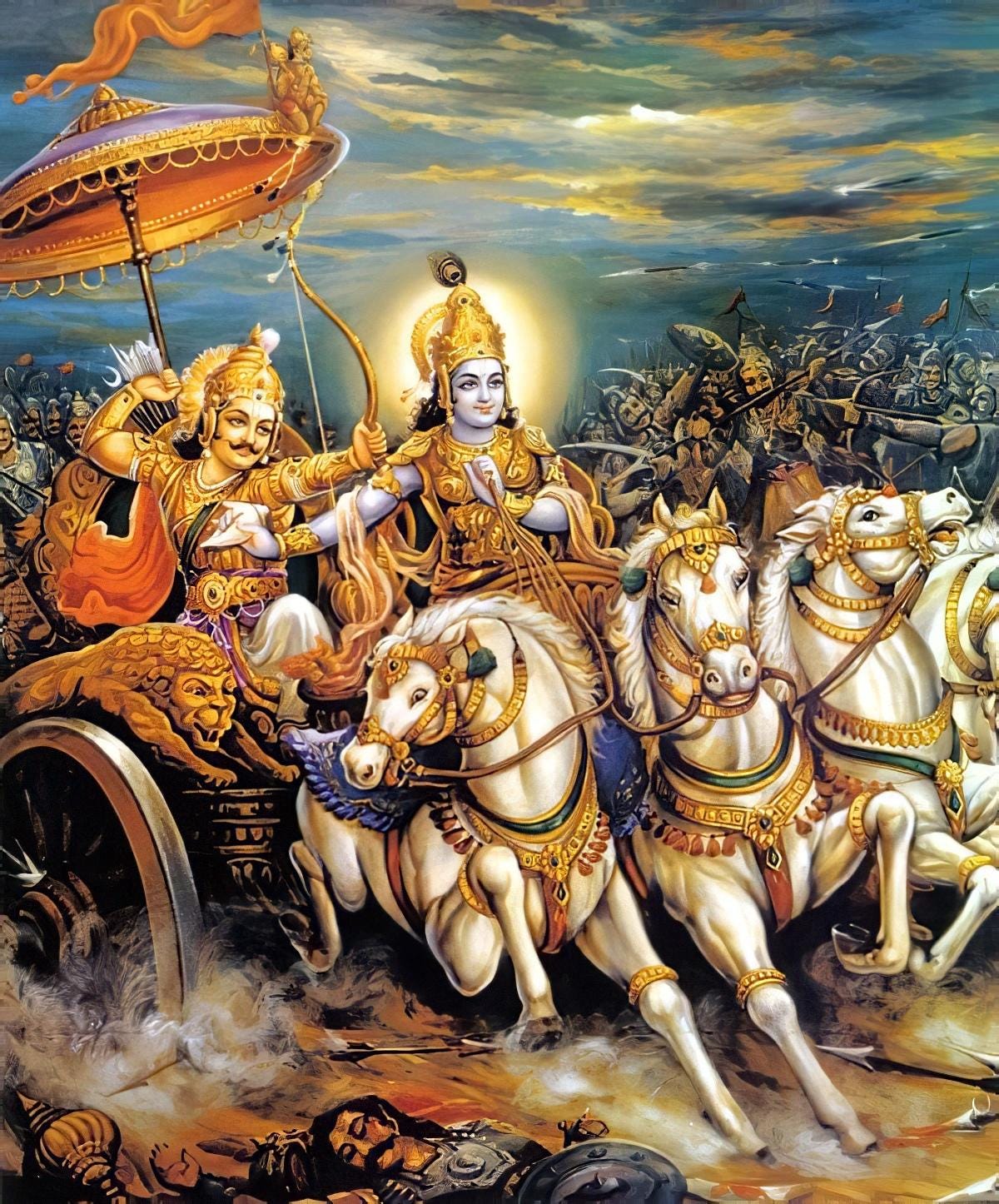A very short summary of the Bhagavad-Gita
We go through many difficult situations in life. We have ups and downs, and often we may just want to abandon everything and dissolve into oblivion. That's what Arjuna wanted to do, but Krsna disagree
We go through many difficult situations in life. We have ups and downs, and often we may just want to abandon everything and dissolve into oblivion. That's what Arjuna wanted to do, but Krsna disagreed.
In the particular case of Arjuna, the question was whether to fight or not in the battle. Krsna argued that the soul is eternal, therefore, Arjuna should perform his duty since he would not really kill anyone. The soul is eternal; therefore, more important than living a few more years here is our next destination. By fighting, Arjuna would secure a better situation both for himself (by performing his dharma and receiving the positive results of it) and for Bhisma, Drona, and others, who would be promoted to the celestial planets after dying in battle. Krsna analyses the situation analytically and concludes that Arjuna performing his duty instead of running away would bring the best results for everyone. From there, Krsna gives more arguments to fight and not leave the battlefield.
Many read the Bhagavad-gita and come to the opposite conclusion. They misunderstand the text and think that the message of the Bhagavad-gita is that I should abandon everything and sit under a tree, while in reality, it is the precise opposite. To run away is easy, but it is rarely the best solution. To stay and fight, use our intelligence to solve problems, and find solutions is the real deal.
Krsna's arguments are centered around Arjuna staying and performing his duties because that's what can bring the best results for ourselves and others. Krsna says to Arjuna that he is not free from desire, and therefore the proper platform for him was to perform his duties, but to do it without attachment, as an offering to him, without considering victory or defeat. In this way, he was going to not only be free from sin and not accumulate any karma from his activities, but in fact, gradually destroy all his previous karma and be elevated to the pure platform.
This is another important nuance. Sometimes the Gītā is interpreted in a mundane way, as some kind of coaching or self-help book that just helps us to find motivation for our ordinary activities, but the real message of the Gītā is gradually bring us to the platform of devotional service, being active, but performing all our activities as a service to the Lord, using all our energy and talents to satisfy the Lord, especially by spreading His mission.
Being fixed in Krsna's service naturally leads us to meditate on Krsna, something that is also emphasized in the Gītā in the six central chapters. As our mind becomes attached to Krsna, we naturally lose the taste for materialistic activities, and we become firmly situated in Krsna Consciousness.
By performing his duty in Krsna Consciousness and fixing his mind in meditation on Krsna, Arjuna would attain perfection and go back to Godhead. That's the advice for all of us.
We may think that Arjuna had an advantage, because Krsna was personally with Him, driving his chariot, but it's actually the same with us. Krsna is inside our hearts, driving the chariot of the body, and He also presents Himself externally in the form of the deity and so many other forms, as He describes in the Bhagavad-Gītā. We are thus always with Krsna, just like Arjuna; we just need to turn to him. Just as Arjuna became enlightened by inquiring from Krsna in a moment of illusion, we can also achieve the same result by accepting and practicing His instructions in the moment of illusion we are currently in.
Takeaway:
Running away is easy, but true growth comes from courageously fulfilling our responsibilities as an offering to Krsna.
Understanding our eternal nature helps us act fearlessly, without lamentation or indecision.
We should perform our duties without attachment to the results, as an offering to Krsna. This protects us from karma and degradation.
Bhagavad-gita guides us beyond mundane concepts, steering us toward pure devotional service and genuine spiritual advancement.
Kṛṣṇa is always with us, internally guiding us from inside the heart and externally in many different forms. We are never alone, but we need to turn to Him.
Fixing our minds on Kṛṣṇa automatically frees us from material distractions and establishes us in spiritual consciousness.
Since you came all the way here, give it a like, or share your impressions:


